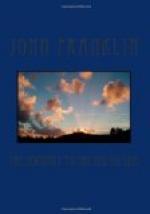I have dwelt in the preceding part of the narrative upon many circumstances of Michel’s conduct, not for the purpose of aggravating his crime, but to put the reader in possession of the reasons that influenced me in depriving a fellow-creature of life. Up to the period of his return to the tent his conduct had been good and respectful to the officers, and in a conversation between Captain Franklin, Mr. Hood, and myself, at Obstruction Rapid, it had been proposed to give him a reward upon our arrival at a post. His principles however, unsupported by a belief in the divine truths of Christianity, were unable to withstand the pressure of severe distress. His countrymen, the Iroquois, are generally Christians, but he was totally uninstructed and ignorant of the duties inculcated by Christianity, and from his long residence in the Indian country seems to have imbibed or retained the rules of conduct which the southern Indians prescribe to themselves.
On the two following days we had mild but thick snowy weather and, as the view was too limited to enable us to preserve a straight course, we remained encamped amongst a few willows and dwarf pines about five miles from the tent. We found a species of cornicularia, a kind of lichen that was good to eat when moistened and toasted over the fire, and we had a good many pieces of singed buffalo hide remaining.
On the 26th, the weather being clear and extremely cold, we resumed our march which was very painful from the depth of the snow, particularly on the margins of the small lakes that lay in our route. We frequently sunk under the load of our blankets and were obliged to assist each other in getting up. After walking about three miles and a half however we were cheered by the sight of a large herd of reindeer and Hepburn went in pursuit of them but, his hand being unsteady through weakness, he missed. He was so exhausted by this fruitless attempt that we were obliged to encamp upon the spot although it was a very unfavourable one.
Next day we had fine and clear but cold weather. We set out early and, in crossing a hill, found a considerable quantity of tripe de roche. About noon we fell upon Little Marten Lake, having walked about two miles. The sight of a place that we knew inspired us with fresh vigour and, there being comparatively little snow on the ice, we advanced at a pace to which we had lately been unaccustomed. In the afternoon we crossed a recent track of a wolverine which, from a parallel mark in the snow, appeared to have been dragging something. Hepburn traced it and upon the borders of the lake found the spine of a deer that it had dropped. It was clean picked and at least one season old, but we extracted the spinal marrow from it which, even in its frozen state, was so acrid as to excoriate the lips. We encamped within sight of the Dog-Rib Rock and from the coldness of the night and the want of fuel rested very ill.




